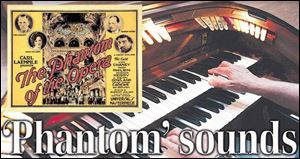
Organ adds its voice to silent film
6/14/2007
The Link/Bennett theater pipe organ, just created and installed by Evan J. Chase, will lend the full panoply of spooky sounds to a screening of the original film, The Phantom of the Opera. Tickets for the performance are $10 at the 1-800-838-3006, at the CAC Web site, www.collingwoodartscenter.org, or at the door. VIP tickets are $30 and include reserved seating and an artist reception with Steven Ball following the concert.
Many Toledoans believe the Collingwood Arts Center in the Old West End has its share of ghosts already, but Sunday at 3 p.m., a unique spirit will manifest (maybe) during the premiere of a brand new instrument in the Lois Nelson Theatre of the historic building.
The Link/Bennett theater pipe organ, just created and installed by Evan J. Chase, will lend the full panoply of spooky sounds to a screening of the original film, The Phantom of the Opera.
As Lon Chaney, Mary Philbin, and Norman Kerry - not to mention A. Gibson Gowland and Arthur Carewe - scare us on the big screen, organist Steven Ball will play the six-rank organ, providing all the background music anyone could want for this 1925 silent-film classic.
Chase spent six weeks blending parts from two antique theater organ. The beautiful wooden console and keyboards were salvaged from a nearly century-old instrument made by the former Link Theater Organ Co. of Binghamton, N.Y. The innards, hundreds of wooden and metal pipes in six ranks, came from the Bennett workshop, a smaller company, according to Chase.
Installed within niches at stage right and left inside the updated Rococo-style Nelson Theater, the pipes can't be seen. But with a few keystrokes by Ball, they will be heard. And felt.
"The acoustics are perfect for a pipe organ," says Chase of the organ's new home. "It makes those six ranks sound like 60. It's phenomenal!"
Before the advent of talking films, theater organs flourished in movie houses coast to coast, he notes.
The theater organ was at its peak between the years of 1915 to 1930 in North America, installed in almost 10,000 theaters. Several companies produced the majority of these organs: Rudolph Wurlitzer Co., Barton (Bartola) Co., Marr & Colton, Kimball, Robert Morton and George Kilgen Co. Many smaller firms also contributed notable instruments.
The double whammy of talkies and the Great Depression rendered most of the organs silent by the mid-1930s.
"Out of this large number, only a small fraction are still extant in 2007, perhaps numbering in the hundreds," says Chase, adding that Toledo was home to around 12 theater organs by 1929. Two are now being played in local theaters - the other Toledo organ, on which Chase also worked, is in the Ohio Theatre on Lagrange Street.
For Chase, reclaiming the rich sonorities and varied sound effects these instruments can produce has been a lifelong passion.
Growing up in the Old West End, he heard the mighty voice of the State Theater organ and was hooked. Training came at his own pace and was an avocation during decades of work at Champion Spark Plug. Today, Chase is secretary of the primary care nursing unit at the University of Toledo School of Nursing.
Ironically, he cannot play the organ he rebuilt.
"I could never get the hang of it," he says. "I can rebuild them and tune them."
Instead, he installs roll players on many organs. There's one on the organ in Chase's South Toledo home and one in the Nelson Theatre organ as well.
"I can still beat the drums and play the xylophones while the roll plays the organ."
Ball, resident organist of the historic Michigan Theater in Ann Arbor, also rebuilds the historic instruments. He has a double master's degree from the University of Michigan in both classical and theater organ performance. He's also a carillonneur and a change ringing specialist who has studied abroad.
Chase says coming to theater organs from the classical world, as Ball did, means his playing will be technically and musically superb. And then, of course, he will add all the special effects - the drums, the tambourine, the xylophone, the glockenspiel, and, who knows, perhaps some scary howls to match the screen action.
Tickets for the performance are $10 at the 1-800-838-3006, at the CAC Web site, www.collingwoodartscenter.org, or at the door. VIP tickets are $30 and include reserved seating and an artist reception with Steven Ball following the concert.
Contact Sally Vallongo at svallongo@theblade.com.